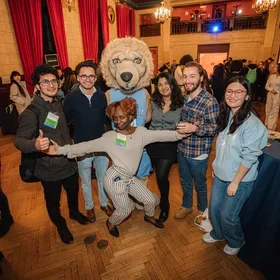By Tighe Sullivan, Student in the M.S. in Sustainability Management Program
There was a time when I was consumed by the thought of the world ending due to the climate crisis. I was kept up at night by worst-case articles about crashing glaciers, fires in the Arctic, and irreversible tipping points. I felt alone, as if the rest of society was just ignoring the issue, marching blindly into our own demise.
My day job in digital marketing felt meaningless; if anything, it was part of the problem. I was trapped, paralyzed by a sense of helplessness. Worst of all, I couldn’t escape these thoughts. This was climate anxiety.
According to a 2022 study from Yale University, one in 10 Americans report feeling nervous, anxious, or on edge because of global warming. A similar number feel depressed or hopeless. While unfortunate, these numbers aren’t surprising. We’re facing an existential threat to the ongoing continuation of our species. Earth, so suitable for human life, is being atmospherically altered and poisoned with plastic. The plants and animals that make up the fabric of our food chain are dying off. Dangerous natural disasters are growing in strength and impact. It’s overwhelming.
Amid a growing sense of helplessness, the COVID-19 pandemic forced me to leave New York City and return to my childhood home in Connecticut. It wasn’t long before photos showed smog-prone cities with clear skies. For the first time in modern history, yearly CO₂ emissions actually went down. Rapid, collective action to develop vaccines also showed that we humans are capable of incredible things when we work together.
Even with these glimpses of hope, my concern persisted, and again, I wasn’t alone. Climate Journalism site Grist found that Google searches for “climate anxiety” soared 565% from August 2020 to August 2021, during the height of the pandemic. A 2024 study published in Climate Risk Management confirmed a correlation between COVID-19 and increased climate change concern, likely because experiencing one crisis can increase sensitivity to other risks.
Searching for purpose, and with plenty of time to spare, I stumbled upon the podcast My Climate Journey, which interviews technology professionals working in sustainability. For the first time, I saw people like me using their skills to fight the climate crisis. It was a revelation: I, too, could align my work with my values. I joined the My Climate Journey messaging board and saw hundreds of people making the shift to align their work with the climate fight. This was a team that I wanted to be a part of. I applied for a few job opportunities I discovered through the online community and landed one.
I now work for a carbon credit startup, helping fund innovative climate solutions. I am pursuing a master’s in Sustainability Management at Columbia University. Every day, I wake up thinking about different components of the climate crisis and exploring solutions with more than 50 colleagues and 500 fellow students.
The problem isn’t any smaller, but I’m now part of a coalition of people working together to build a future we’re proud of. My eco-anxiety isn’t gone, but it’s far lower, and I can attribute this directly to working on solutions. Whereas once I felt powerless to influence either the problem or the solutions, now, I’m learning more about the challenges every day; with that growing knowledge, I’m able to make a greater positive impact.
I now understand that every tenth of a degree of global warming prevention is worth fighting for because a world that is 1.5 degrees Celsius warmer than pre-industrial times is significantly less harmful than one that is 1.6 degrees warmer. By joining the climate movement, whether through your career or your vote, you can help strengthen our collective efforts and increase the chances of our success.
I also feel proud to play a role, however small, in helping others join the fight, whether by recommending an eco-friendly clothing brand or helping a friend transition their career into a climate-oriented one. When others are involved, the impact of my efforts feel larger—like they’ll ripple into something greater.
Again, this phenomenon isn’t unique to me. A 2022 study in Current Psychology found that individuals actively engaged in environmental activism exhibited fewer negative mental health symptoms. But individual actions—like recycling or turning the lights off—don’t lessen climate anxiety to the same degree as collective action. It’s in larger, organized groups that community connection and hope can grow.
I’m still very worried about climate change. But worry is a catalyst, not a burden. My worry propels me forward and connects me with others in this vital fight. My worry inspires me to work on climate for the rest of my life and meet a lot of like-minded people along the way.
My journey from climate anxiety to action has shown me this: the path to a livable future isn’t solitary—it’s collective. So many of us in this world are experiencing feelings of anxiety and uncertainty due to the climate crisis. So many of us are also working on solutions, which is empowering and comforting.
I invite you to join us: whether through your career, your choices, or your voice. Find your place in this movement. Engage with others in the work. I think you’ll find that despair and anxiety can be turned into hope, and even joy.
About the Program
The Columbia University M.S. in Sustainability Management program, offered by the School of Professional Studies in partnership with the Climate School, provides students with cutting-edge policy and management tools they can use to help public and private organizations and governments address environmental impacts and risks, pollution control, and remediation to achieve sustainability.
The fall 2025 application deadline for the M.S. in Sustainability Management program is May 1. Learn more about the program here.


